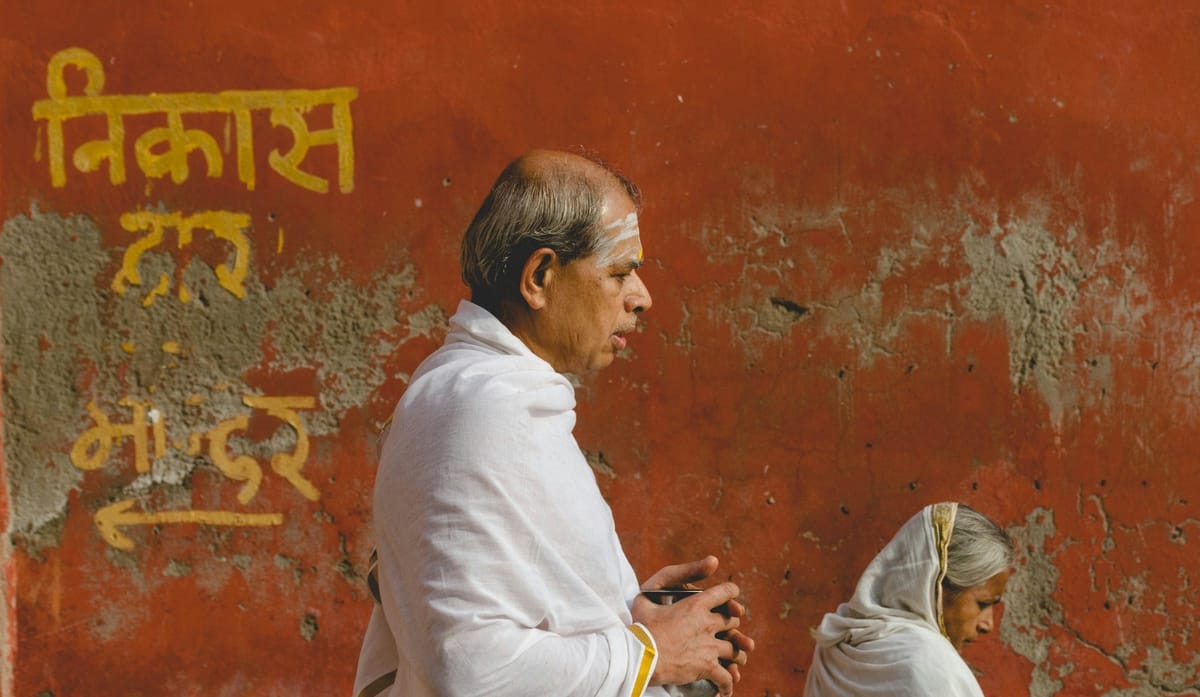India Has A New Religion

The greatest trick a religion ever pulled was convincing people it wasn't a religion at all.
Walk into any drawing room in Delhi, Mumbai, or Bangalore and mention you're proud of India's Hindu heritage. Watch the temperature drop. See the sudden interest in phones, the urgent need to refresh drinks. See how quickly the conversation shifts to safer ground—cricket, perhaps, or the weather.
This isn't accidental. It's the natural response of a society that has successfully installed a new state religion, one so effective that its adherents don't even realize they're believers.
The Conversion Process
The problem with most secular Indians is they've never examined their own dogma. They've never asked why acknowledging India's civilizational roots feels dangerous to them. They've never wondered why they can celebrate Christmas in Mumbai's malls but get uncomfortable when someone mentions Diwali's philosophical significance.
They've never noticed they're practicing a faith.
The problem with most secular Indians is they mistake cultural amnesia for sophistication. They think forgetting where you came from makes you modern. They confuse colonial-era interpretations of Indian history with objective truth.
The problem with most secular Indians is they enforce their beliefs with religious zeal. Question their version of tolerance and watch your social capital evaporate faster than water puddles in April. Try suggesting that maybe, just maybe, India's spiritual traditions contributed something valuable to human knowledge. See how quickly you're branded a "right-wing extremist."
The problem with most secular Indians is they've created a caste system of their own. At the top sit those who perform the right rituals—public displays of religious "tolerance" that often feel forced and performative. Below them are the cautious middle classes, navigating carefully between acceptable and unacceptable thoughts. At the bottom are the heretics—anyone who celebrates India's Hindu heritage too enthusiastically.
The problem with most secular Indians is they practice selective blindness. They can spot "communalism" in a Hindu festival being celebrated in a government office from three kilometers away. But they somehow miss the preferential treatment given to "minority" religious practices in the same building.
None of this happens in a vacuum. The social enforcement is backed by an entire academic apparatus that provides intellectual cover.
The Sacred Texts
Every religion needs its holy books. Indian secularism has chosen well.
First, there are the colonial-era history books that minimize indigenous knowledge. These texts present a version of Indian history where sophistication begins with foreign rule and indigenous thought is relegated to "superstition." Question these interpretations and you're not just wrong—you're dangerous.
Then come the modern academic works that treat India's spiritual traditions as anthropological curiosities rather than living philosophies. These scholars can spend careers studying consciousness, metaphysics, and ethics while somehow missing that Indian traditions offered sophisticated perspectives on these subjects long before the Enlightenment.
The moment you realize how thoroughly this works is when you notice educated Indians defending their civilization using only Western frameworks. They can't explain why yoga matters without citing American research papers. They can't discuss meditation without referencing Buddhist studies from European universities. They've been trained to distrust their own intellectual heritage.
The Enforcement Mechanism
But what happens when you violate the new secular orthodoxy?
First, you're labeled. "Fundamentalist." "Communal." "Right-wing." "Sanghi". The labels come fast and stick hard. Your arguments don't matter—you've been categorized.
Next, you're marginalized. Invitations dry up. Publishers become suddenly unreachable. Your social media becomes an echo chamber of the already converted because everyone else has quietly unfollowed.
Finally, you're dismissed. Your ideas aren't engaged with—they're explained away. "Oh, he's become very religious lately." "She's too radical." "They're just catering to their base."
The beauty of this system is its plausible deniability. No one's being persecuted, you understand. People are just naturally avoiding extremists. The market of ideas is simply correcting itself.
The Selective Vision
Weeks before any major Hindu festival, notice how the media coverage begins. The focus isn't on the philosophical significance or cultural richness. It's on the problems—the environment, the noise, the traffic. The assumption is that any public expression of Hindu tradition is inherently problematic.
But during minority religious festivals the coverage shifts to cultural harmony, diversity, and the beauty of India's pluralistic society. The same newspapers that worried about environmental damage from Diwali crackers somehow forget to mention it during bakr-eid.
Is this secularism? Or is this preferential treatment masquerading as neutrality?
The tragedy isn't just that we're losing religious tradition. It's that we're losing the deep intellectual heritage of a civilization—a heritage that offered sophisticated perspectives on consciousness, metaphysics, ethics, and human potential long before these became fashionable in Western universities.
Walk through any Indian university's philosophy department. Count how many courses are dedicated to Indian philosophical traditions versus Western ones. Notice how students can graduate with degrees in philosophy while remaining largely ignorant of Advaita Vedanta, Samkhya, or Kashmir Shaivism.
This is the natural result of a system that has successfully convinced people that valuing their own intellectual heritage makes them less sophisticated, less modern, less progressive.
The irony is painful: in the name of inclusivity, we exclude. In the name of tolerance, we grow intolerant of our own past.
The Way Forward
True secularism would mean the state treats all faiths equally—neither promoting nor penalizing any tradition. It would create a framework where diversity of thought thrives, where indigenous knowledge systems are valued alongside modern ones, where criticism flows in all directions.
A truly secular India wouldn't fear its Hindu roots any more than France fears its Catholic heritage or Japan its Shinto traditions. Cultural confidence and secularism aren't opposing forces—unless your version of secularism is actually a competing faith.
Start with the smallest possible version: stop feeling embarrassed about your civilization's intellectual contributions. Stop defending Indian traditions using only Western frameworks. Stop treating acknowledgment of India's spiritual heritage as inherently problematic.
The way forward is reclaiming secularism from those who've transformed it into a weapon against India's civilizational memory. We need a secularism that makes space for all voices, including those that have been speaking for thousands of years on Indian soil.
Otherwise, we've just established a new state religion—one that, like many before it, demands we sacrifice our identity at its altar. And that's no progress at all.





